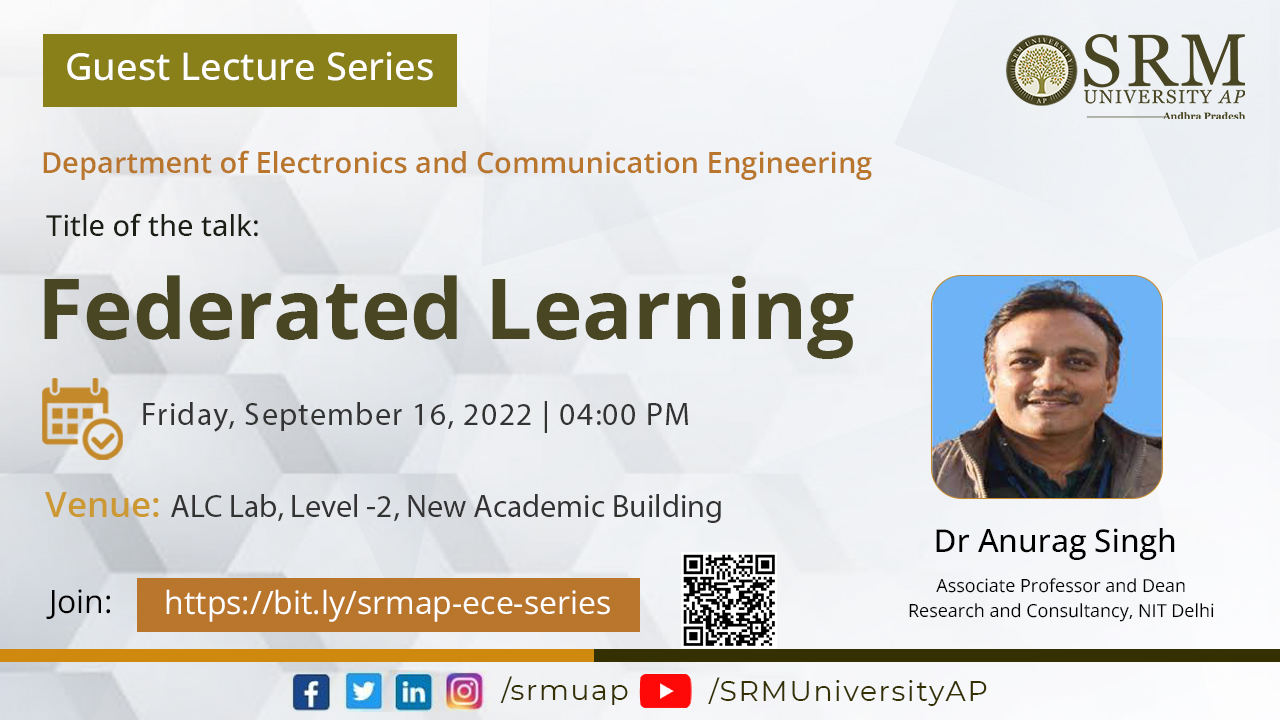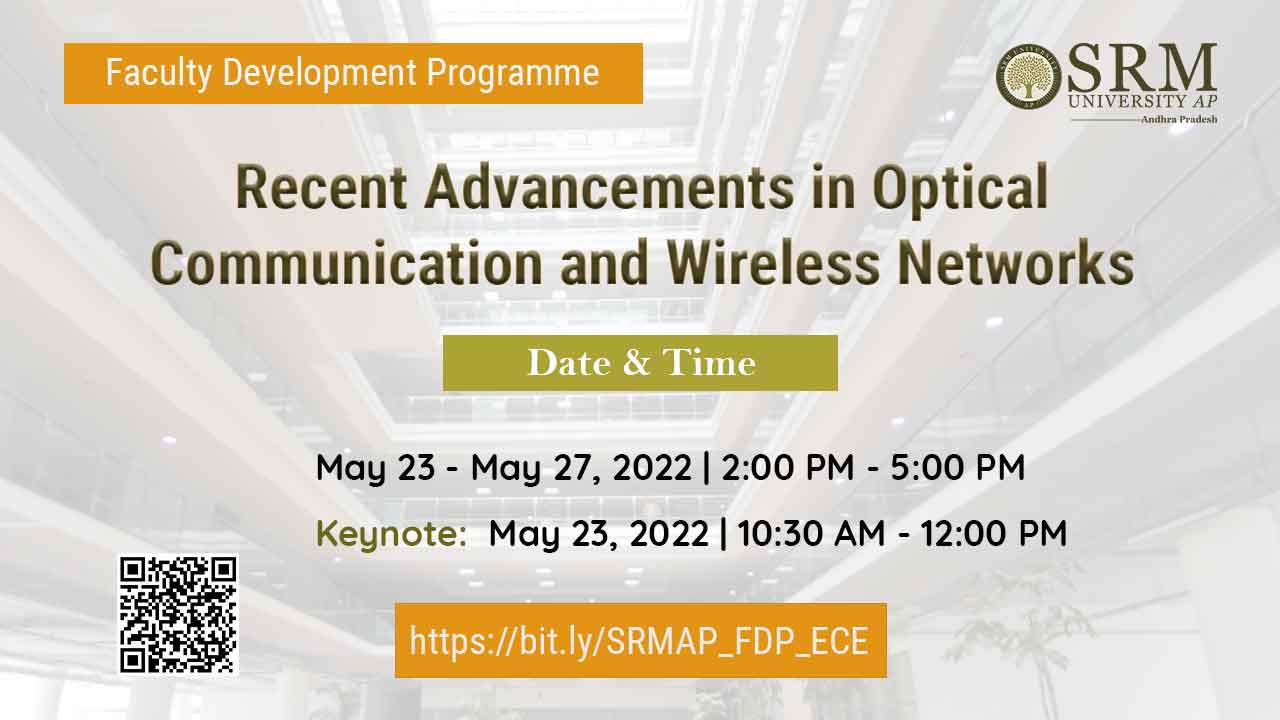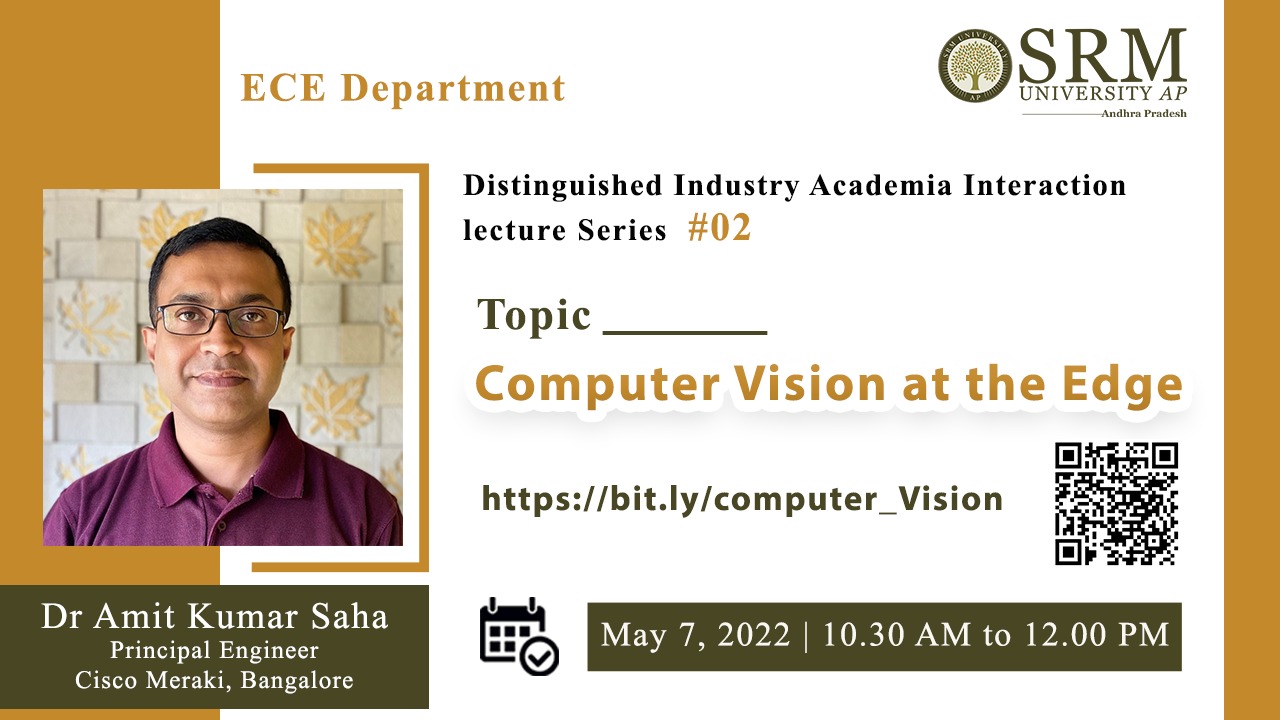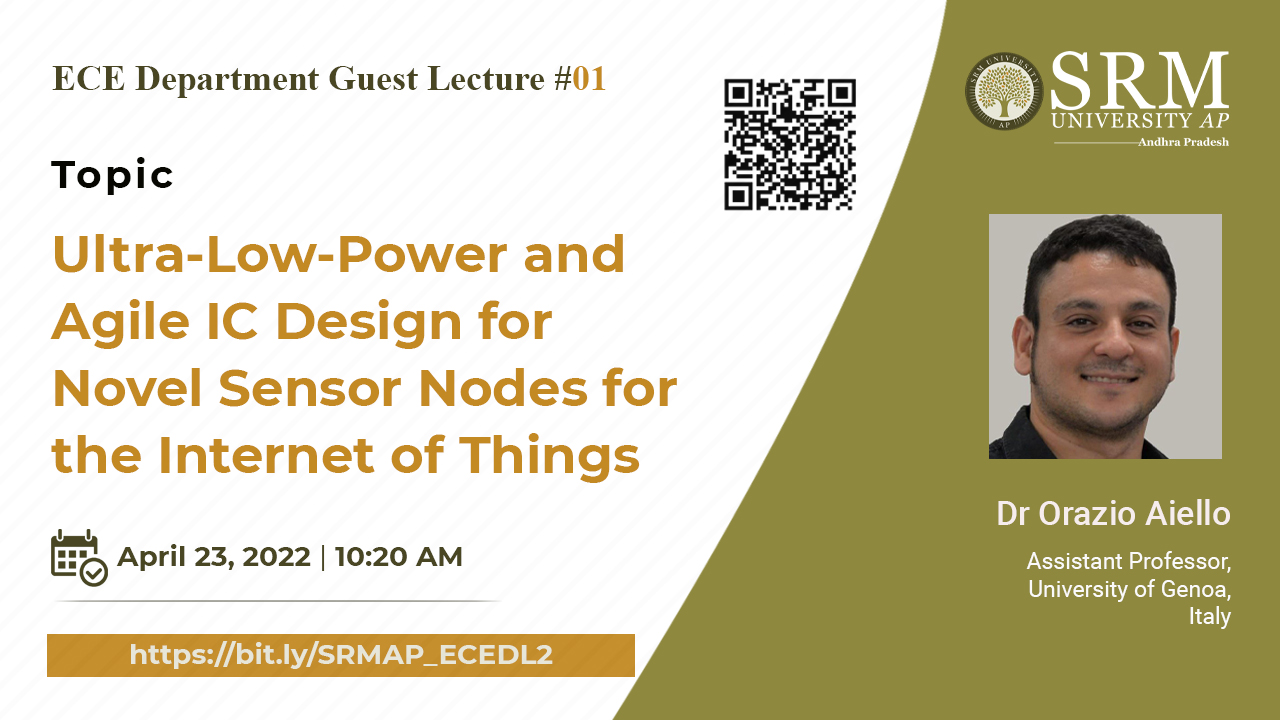All ECE Events
- An introduction to federated learning September 14, 2022

The Department of Electronics and Communication Engineering is hosting a seminar on September 16, 2022, at 4.00 pm as part of the Guest Lecture Series. Dr Anurag Singh, Associate Professor and Dean of Research and Consultancy, NIT Delhi, will deliver a talk on the topic “Federated Learning”.
Abstract of the talk
The most crucial resource for any business, individual, or person in the world is data. Everyone, whether an individual or an institution, wants to prevent a data breach. High-quality data must be subjected to machine learning algorithms. The model is trained using traditional machine learning techniques, which save data to one server. There is a chance that this method will expose personal information. A machine learning technique called federated learning (FL) enables machine learning models to train on various datasets located on various sites without sharing data. Without putting training data in a centralised location, it enables the development of a common global model. Additionally, it permits personal information to stay in local places, lowering the risk.
A new area of machine learning called federated learning already offers greater advantages than conventional machine learning techniques.
Data Security: Training data is kept locally on the devices, negating the need for a data pool.
Data variety: Heterogeneous data since it incorporates information from various users.
Real-time continuous learning: Client data is used to enhance models continuously.
Federated Learning is applied in the field of IoT, Healthcare, smartphones, Advertising, Autonomous Vehicles etc.
Speaker’s Profile
Dr Anurag Singh is currently working as the Associate Professor and Dean of Research and Consultancy at NIT Delhi. He received his PhD from the Indian Institute of Technology Kanpur. His research areas are Network Theory, Dynamics on/of Networks, Opinion Dynamics, Epidemic Modeling, Intelligent transportation system etc. Dr Anurag Singh has teaching experience at both undergraduate and graduate levels. He has taught courses ranging from the introductory level to specialized courses in Computer Science and Engineering, and Mathematics. Currently, he is mentoring students at graduate and undergraduate levels at the National Institute of Technology Delhi, India. In addition, he has also been supervising PhD students. He has around 70 publications featured across various leading journals and three DST-funded projects to his credit.
Continue reading → - An introduction to federated learning September 13, 2022
The Department of Electronics and Communication Engineering is hosting a seminar on September 16, 2022, at 4 pm as part of the Departmental Distinguished Lecture Series. Dr Anurag Singh, Dean of Research and Consultancy, NIT Delhi, will deliver a talk on the topic “Federated Learning”.
Abstract of the talk
The most crucial resource for any business, individual, or person in the world is data. Everyone, whether an individual or an institution, wants to prevent a data breach. High-quality data must be subjected to machine learning algorithms. The model is trained using traditional machine learning techniques, which save data to one server. There is a chance that this method will expose personal information. A machine learning technique called Federated Learning (FL) enables machine learning models to train on various datasets located on various sites without sharing data. Without putting training data in a centralised location, it enables the development of a common global model. Additionally, it permits personal information to stay in local places, lowering the risk.
A new area of machine learning called federated learning already offers greater advantages than conventional machine learning techniques.
Data Security: Training data is kept locally on the devices, negating the need for a data pool.
Data variety: Heterogeneous data since it incorporates information from various users.
Real-time continuous learning: Client data is used to enhance models continuously.
Federated Learning is applied in the field of IoT, Healthcare, smartphones, Advertising, Autonomous Vehicles etc.
Speaker’s Profile
Dr Anurag Singh is currently working as the Associate Professor and Dean of Research and Consultancy at NIT Delhi. He received his PhD from the Indian Institute of Technology Kanpur. His research areas are Network Theory, Dynamics on/of Networks, Opinion Dynamics, Epidemic Modeling, Intelligent transportation system etc. Dr Anurag Singh has teaching experience at both undergraduate and graduate levels. He has taught courses ranging from the introductory level to specialized courses in Computer Science and Engineering, and Mathematics. Currently, he is mentoring students at graduate and undergraduate levels at the National Institute of Technology Delhi, India. In addition, he has also been supervising PhD students. He has around 70 publications featured across various leading journals and three DST-funded projects to his credit.
Continue reading → - Faculty Development Programme on Optical Communication and Wireless Networks May 21, 2022
 SRM University AP is delighted to announce the Faculty Development Programme on Recent advancements in optical communication and wireless networks. The session is scheduled from May 23 to 27, 2022. The programme will be managed by the faculties of the Department of Electronics and Communication Engineering. This five-day hybrid programme aims to enhance research capabilities mainly for the researchers and professionals working in Free Space Optics and Advanced Wireless Communication Networks. Eminent scientists and professors from highly reputed institutes are invited to share their research experiences.
SRM University AP is delighted to announce the Faculty Development Programme on Recent advancements in optical communication and wireless networks. The session is scheduled from May 23 to 27, 2022. The programme will be managed by the faculties of the Department of Electronics and Communication Engineering. This five-day hybrid programme aims to enhance research capabilities mainly for the researchers and professionals working in Free Space Optics and Advanced Wireless Communication Networks. Eminent scientists and professors from highly reputed institutes are invited to share their research experiences.On the first day of the session, the keynote speaker, Professor M.S Alouini, KAUST, Saudi Arabia, will handle a session on Towards Connecting the Remaining 3 + Billion from 10.30 am to 12.00 pm. The FDP targets faculties from Abroad and Indian Institutes, Research scholars, Postgraduate and Undergraduate students. The sessions will be beneficial to those participants who are doing or planning to start a research career in optical/wireless communication network domains.
A wide variety of topics will be discussed during the five-day program. Visible light communication, Optical Imaging and Holography, Computational Optical Sensing and Imaging, VLC for IoT Networks, Terahertz Photonics for Wireless Communications, Deep learning for Wireless Networks, Intelligent Reflecting Surfaces, Edge Computing for IoT Networks, Beyond 6G Communications and Molecular Communications are some of the crucial ones among them.
There is no registration fee for the programme. However, the certificate will be provided to all the attendees based on the total attendance. The recordings of the sessions will also be provided to all attendees.
Continue reading → - Engineering and research challenges in building smart cameras May 6, 2022
 Machine Learning has started its move from the cloud to the periphery of the network. Today’s edge devices are becoming smarter and are no longer the dumb devices that would simply transmit the data to some central location. The Department of Electronics and Communication Engineering is conducting the 2nd department distinguished Industry-Academia Interaction lecture in the ECE DDIAIL series. Dr Amit Kumar Saha, Principal Engineer at Cisco Meraki, Bangalore, will deliver a talk on the topic ‘Computer vision at the edge’.
Machine Learning has started its move from the cloud to the periphery of the network. Today’s edge devices are becoming smarter and are no longer the dumb devices that would simply transmit the data to some central location. The Department of Electronics and Communication Engineering is conducting the 2nd department distinguished Industry-Academia Interaction lecture in the ECE DDIAIL series. Dr Amit Kumar Saha, Principal Engineer at Cisco Meraki, Bangalore, will deliver a talk on the topic ‘Computer vision at the edge’.The talk will focus on the evolution of a specific type of edge device, the surveillance camera, from the traditional CCTV model to the smart camera model. It will discuss some of the engineering and research challenges in building smart cameras that lie at the periphery of the network.
Date: May 7, 2022
Time: 10.30 am to 12.00 pm IST
About the speaker
Dr Amit Kumar Saha is the Principal Engineer at Cisco Meraki, Bangalore. He received his PhD degree from Rice University in 2007. Prior to that, he obtained his BTech degree from IIT Kharagpur as a recipient of Dr B C Roy Gold Medal in 1999 for being the single graduating student with the best mix of academics and extracurricular activities. Dr Amit explores the next generation of technology at the intersection of networks, distributed systems, and data science, with a special emphasis on system-wide design. He is part of Cisco Meraki’s Camera Intelligence team and enables Cisco’s internal products as well as customers better manage their AI/ML life cycles by making it easier to train and tune models and deploy distributed machine learning workloads. He passionately seeks out opportunities to give back to the community through talks, research collaborations, organising conferences, and as visiting faculty at several top institutes in India.
Join the webinar and learn from industry professionals
- Ultra-low power and agile IC design for novel sensor nodes for the Internet of Things April 20, 2022

The Internet of Things (IoT) has greatly increased our awareness of the world and broadened the scope of our engagement with it. In the first episode of the ECE Department Guest Lecture Series, the Department of Electronics and Communication Engineering at SRM University-AP is organising a lecture on April 23, 2022, from 10.20 am to 12.00 noon. Dr Orazio Aiello, Assistant Professor at the University of Genoa, Italy, will engage the audience on the topic Ultra-Low-Power and Agile IC Design for novel Sensor Nodes for the Internet of Things on that day.
The vision of a world where pervasive integrated electronic systems embedded in everyday life objects (e.g. household appliances, surveillance cameras, healthcare systems) are fully interconnected to collect, process, and exchange useful information requires energy-autonomous systems for distributed sensing and data acquisition. The low-cost requirement demands a small area, low design effort, digital-like shrinkage across CMOS generations, and design/technology portability. The possibility to exploit the digital (automated) design flow even for analog building blocks can dramatically reduce the design effort of any system-on-chip that faces the analog signal. Since data processing is digital, but most signals from the real world are analog, almost any electronic device that interfaces with the surrounding environment will benefit from the outcomes of this investigation. In this framework, the talk illustrates the concepts and the design flows which enable the implementation of analog functions by true digital circuits.
Biography of the speaker:
Orazio Aiello (Senior Member, IEEE) received the BSc and MSc degrees (cum laude) from the University of Catania, Italy, in 2005 and 2008, respectively, the M.Sc. degree (cum laude) from the Scuola Superiore di Catania, Italy, in 2009, and the PhD degree from the Politecnico di Torino, Italy, in 2013.,From 2008 to 2009, he was an Analog IC Designer and an EMC Consultant for STMicroelectronics, Castelletto, Italy. In 2012, he was a Visiting PhD. A student with Monash University, Melbourne, Australia. In 2013, he was a Research Fellow in a joint project with FIAT-Chrysler Automobiles, Turin. In 2014, he joined NXP-Semiconductors, Nijmegen, The Netherlands, as a Mixed Signal IC Designer and an EMC Expert. In 2015 and 2016, he was a Visiting Fellow with the University of Sydney and the University of New South Wales, Sydney, Australia. Since 2015, he has been working with the Green IC Group, Department of Electronics and Communication Engineering (ECE), National University of Singapore, where he has also been a Marie Skłodowska-Curie Individual and a Global Fellow leading the ULPIoT project. He is now an Assistant Professor at the University of Genova, Italy. His main research interests include energy-efficient analogue-mixed signal circuits and sensor interfaces. Dr Aiello is a member of the IEEE CASS Microlearning AdHoc Committee and is/was a Technical Program Committee Member of a number of conferences, such as NORCAS and APCCAS.
Join this informative lecture with Dr Orazio Aiello on April 23, 2022 at 10.20 am IST.
Continue reading →

